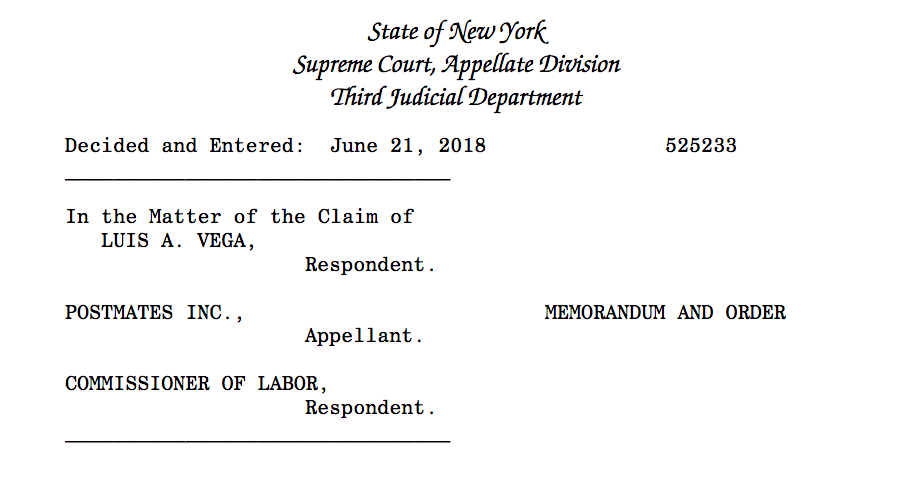- Free Consultation: (631) 352-0050 Tap Here to Call Us
New York Court Rules Delivery Drivers Not Employees

A New York company operates a website whereby users can place delivery orders from local stores and restaurants. The company uses couriers to pick up the orders and deliver them to the customers. Are these couriers employees under New York law? Today’s Long Island employment law blog discusses how a New York appellate court came decided the issue of whether these couriers are employees of the company?
In the case of Matter of Vega, heard and decided by New York’s Third Department, the company, Postmates, Inc. “engaged” individuals to perform work for the company. As noted, Postmates operated a website whereby customers can place orders at local restaurants and stores. The orders are picked up by couriers, such as Vega, and delivered to the customers.
Postmates, however, terminated Vega alleging, among other things, that it had received negative customer feedback about him. So, Vega filed for unemployment insurance benefits, but Postmates challenged the claim. Initially, a worker’s compensation Administrative Law Judge decided that Vega was not eligible for unemployment benefits because he was not an employee. On appeal to the Unemployment Insurance Appeal Board, however, the Board reversed that determination and decided that Vega was indeed an employee, making him eligible for benefits.
Postmates appealed the decision to New York’s Appellate Division, Third Department where the case was heard by a panel of three judges. The Appellate Court noted the high standard of review which is applicable to appeals which come before the Court from administrative agencies, such as the Unemployment Appeal Board. The standard is that the Court must uphold the agency’s determination if it is supported by substantial evidence.
The Appellate Court also restated the law concerning whether an employer-employee relationship exists in New York, at least for purposes of unemployment insurance benefits. In New York, Court will look at whether the purported employer exercises control of the results of the work or the means used to obtain the results. But, an employer’s incidental control is not enough to establish an employer-employee relationship.
Turning to the facts of the Vega case, the Third Department determined that Postmates required only a minimal application process, requiring candidates download a form from its websites and provide only basic pedigree information. The Court noted that although Postmates performs a criminal background check and requires couriers to undergo a software orientation session, there is little supervision thereafter. The Court found persuasive the fact that couriers retain complete discretion as to whether they want to ever log into the Postmates’ system to obtain work and if they choose to work, they can work as much or as little as they want.
Further, the Court determined that while couriers were logged into the system indicating their availability to make deliveries, they remained free to work for anyone else, including competitors. Finally, the Court determined that the couriers decide which mode of transportation to use, which route to use, and they don’t wear a uniform or other identification.
On the other hand, the Court found some level of control, including that Postmates sets the fees and rates to be paid, tracks deliveries, and handles customer complaints, the Court ultimately was not persuaded that substantial evidence existed to support the conclusion that the couriers are employees.
Notably, Justice Lynch dissented and indicated he would have held that substantial evidence does exist to support an employer-employee relationship. Justice Lynch noted the criminal background check point, the orientation, and other requirements Postmates places on couriers.
In sum, the Vega decision shows the difficulties in determining whether workers are employees or independent contractors. The determination has important implications for minimum wage and overtime laws, workers compensation, and unemployment insurance benefits rules. If you have a question about how to classify a worker as an independent contractor or employee, speak to a Long Island employment lawyer today at 631-352-0050.
Is there an employer-employee relationship?








